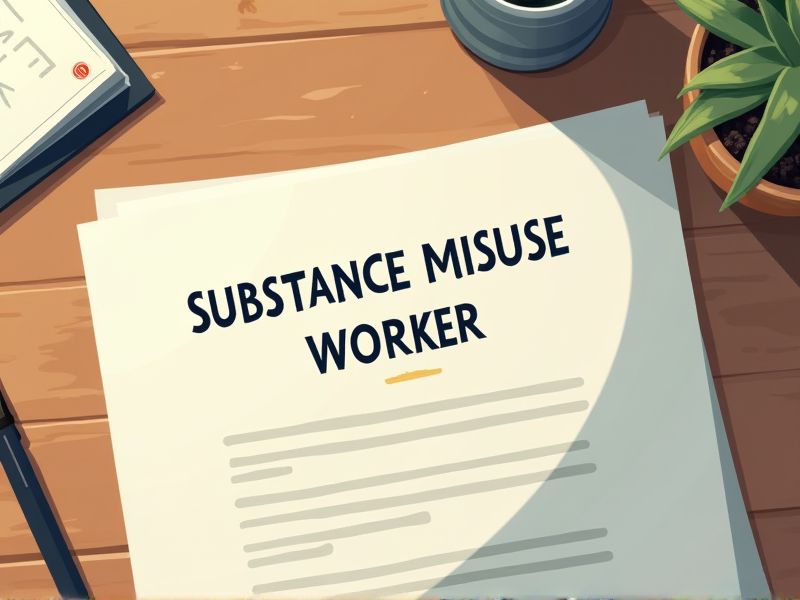
Substance Misuse Workers play a crucial role in supporting individuals grappling with addiction, requiring them to possess specialized knowledge and skills. Certifications ensure that these professionals are equipped with the latest methodologies and ethical standards in substance misuse interventions. Without proper accreditation, workers might lack the credibility and proficiency needed to effectively assist clients. Key certifications for a Substance Misuse Worker can significantly enhance capability and trustworthiness.
Certified Substance Abuse Counselor (CSAC)
A Certified Substance Abuse Counselor (CSAC) possesses specialized training and knowledge essential for effectively identifying and addressing substance misuse issues. The CSAC credential ensures that these professionals adhere to established ethical standards, reducing the likelihood of malpractice or harm to clients. This certification provides credibility and trustworthiness, which can increase engagement and positive outcomes with individuals seeking help. Demand for substance misuse workers with certified expertise is rising due to growing concerns over widespread addiction and its societal impacts.
Licensed Alcohol and Drug Counselor (LADC)
Licensed Alcohol and Drug Counselors (LADCs) possess specialized expertise that enhances the effectiveness of substance misuse interventions. Their training in evidence-based therapeutic approaches aids in tailoring strategies to individual client needs. The presence of LADCs ensures adherence to ethical and professional standards, maintaining the integrity of treatment programs. Their ability to assess and monitor progress plays a critical role in optimizing recovery outcomes.
National Certified Addiction Counselor (NCAC)
The National Certified Addiction Counselor (NCAC) credential establishes a standardized competency level for professionals working with substance misuse, ensuring they possess the necessary skills and knowledge. The certification enhances the effectiveness of treatment strategies, leading to improved recovery outcomes for individuals dealing with addiction. Securing the NCAC designation promotes credibility and trust among clients and employers, which can result in better engagement and success rates. This professional standard supports ongoing education, keeping counselors updated on best practices and emerging evidence-based approaches.
Certified Addictions Counseling Specialist (CACS)
A Certified Addictions Counseling Specialist (CACS) provides specialized skills in understanding the complex dynamics of addiction, enabling more effective interventions. Their certification ensures a standardized level of expertise, improving the quality of care for individuals battling substance misuse. The CACS also stays updated with the latest research and treatment approaches, which is crucial in an ever-evolving field like addiction. Their role often includes not just direct counseling but also guiding comprehensive recovery plans, ensuring a holistic approach to treatment.
Certified Peer Recovery Specialist (CPRS)
Substance misuse workers often face challenges in building trust and relatability with clients, so Certified Peer Recovery Specialists (CPRS) can bridge this gap through shared lived experiences. The presence of CPRS can enhance engagement and retention rates in treatment programs, because clients often feel more understood and supported. Having CPRS on the team can also reduce stigma, as they normalize the recovery process by sharing their own journey. CPRS can provide valuable insights into non-clinical aspects of recovery, enriching the treatment framework offered by substance misuse workers.
Certified Mental Health and Substance Abuse Professional (CMHSAP)
Substance misuse often co-occurs with mental health disorders, requiring a CMHSAP's expertise in both areas to provide comprehensive care. The complexity of addiction and mental health interplay necessitates specialized assessment skills and tailored intervention approaches that a CMHSAP possesses. A CMHSAP's training equips them to design integrated treatment plans that address the root causes of substance misuse, improving long-term recovery outcomes. Regulations and professional standards increasingly demand credentialed practitioners to ensure ethical and effective service delivery in substance misuse settings.
Board Certified Addiction Specialist (BCAS)
Substance misuse workers often encounter complex cases involving diverse addiction patterns that require expert guidance; a Board Certified Addiction Specialist (BCAS) provides authoritative insights rooted in evidence-based practices. BCAS certification indicates a deep understanding of addiction dynamics, enhancing a substance misuse worker's ability to tailor effective interventions. The certification ensures adherence to consistent standards of care, reducing potential missteps in treatment plans. This credential fosters trust among clients and colleagues, as it signals a commitment to ongoing education and professional excellence in addiction management.
Certified Crisis Intervention Specialist (CCIS)
Substance misuse often involves volatile and high-stakes situations, necessitating a Certified Crisis Intervention Specialist (CCIS) to effectively manage and de-escalate crises. Their expertise equips them to identify and address potential triggers, leading to improved outcomes for individuals in distress. Having a CCIS on the team enhances the worker's ability to foster a safe environment, which is crucial for successful intervention. Their specialized skills also support engagement strategies, ensuring that clients receive the most appropriate support.
Certified Behavioral Health Technician (CBHT)
The role of a Certified Behavioral Health Technician (CBHT) is crucial for Substance Misuse Workers because they bring specialized knowledge and skills essential for effective patient support. Their certification ensures a standardized level of competence, which helps improve treatment outcomes for individuals facing substance misuse challenges. By understanding behavioral therapies, a CBHT can accurately identify patterns and triggers, facilitating targeted intervention. Their expertise also aids in bridging communication between patients and other healthcare professionals, enhancing comprehensive care.
Certified Trauma-Informed Care Specialist (CTICS)
Substance misuse workers often encounter individuals with histories of trauma, which can exacerbate addiction and create barriers to recovery. Training as a Certified Trauma-Informed Care Specialist equips these professionals with skills to recognize and address trauma's impact, fostering a more empathetic and effective approach. With a trauma-informed lens, workers can develop strategies that reduce re-traumatization and improve client engagement. The CTICS credential signifies a commitment to understanding the complex interplay between trauma and substance misuse, enhancing the overall quality of care provided.
Summary
When you achieve certifications as a Substance Misuse Worker, your skills and knowledge become more recognized by employers. This formal acknowledgment often leads to increased job opportunities and enhanced career prospects. Employers may perceive you as more competent and credible, potentially leading to higher wages or promotions. Certified workers frequently report higher client trust and satisfaction, improving treatment outcomes.
